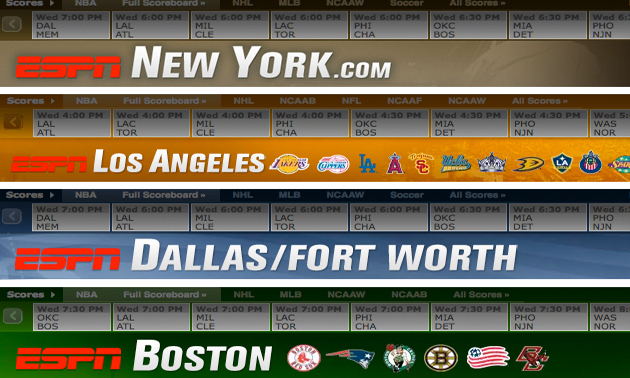Last week, ESPN unveiled three writers to cover the Boston Red Sox, Los Angeles Dodgers and the St. Louis Cardinals. Of the three, only one was a totally “new” hire, Scott Lauber was lured from the Boston Herald to the Worldwide Leader to cover the Red Sox. The other two, Mark Saxon will cover the Cards and comes from ESPN Los Angeles, and Doug Padilla will cover the Dodgers and he’s being repurposed from ESPN Chicago.
Seeing that two of the writers are coming from ESPN’s regional sites which launched to so much fanfare in 2009-10, it made us wonder at the Awful Announcing offices, what happened to those sites? ESPN launched its first local site, ESPN Chicago in 2009 and it was followed by others for Boston, New York, Los Angeles and Dallas. Coupling their sites with their radio affiliates, some owned-and-operated, ESPN hired writers and tailored content for each city. It seemed that ESPN was not only going to be a global juggernaut, but also a local one.
In Sports Business Journal, then-ESPN President George Bodenheimer sounded excited about the local sites and expanding the company’s brand into local sports:
“We’re extremely bullish on this,” ESPN President George Bodenheimer said last month. “We’ve definitely been encouraged by the success in Chicago to date and see this as something really important going forward.”
SBJ also quoted a Worldwide Leader executive, Jim Pastor, a senior vice president for business divisions about the mission statement for the local sites:
“There’s going to be very little content ported over,” Pastor said. “We’re not simply aggregating Boston content from other sources. This is really about seeing how we can deploy our resources in a better way to serve fans, and as a business, this is something where we see a lot of upside.”
And while the ESPN did provide the resources for the sites at the beginning, they now appear to be no more than just repackaging and aggregating of national stories.
Back in 2009, it wasn’t just ESPN that was making the leap into local sites, SB Nation, Fox Sports and Comcast SportsNet all launched sites that were supposed to provide fans in their cities with content and attract readers.
But a funny thing happened as we cruised into the 2010’s. ESPN, Fox and especially SB Nation decided to pull the resources to those local sites. Our Ben Koo looked at what happened when Fox announced it was laying off staffers at its regional sites last year and explored the machinations with SB Nation, ESPN and Fox.
The regional channels had to worry about ESPN, who suddenly seemed interested in extending their fiefdom and drinking local media’s milkshake. SBN and others weren’t going to let the dust settle and jumped in as well.
Fast forward to now and SBN’s local portals are long gone, ESPN hasn’t launched any additional local sites beyond their initial batch and those still up are essentially shells that the Fox sites will likely soon mirror.
And it’s true. The ESPN Boston, Chicago, Dallas, New York and Los Angeles sites are not what they once were when they were filled with plenty of local stories. They’re now just repurposed stories from the national site. While there are still some people from the original hirings who are remain with ESPN, we don’t see the WWL making splashes by luring writers from the local papers to work on those sites. Instead, we see ESPN going in a different direction.
They’re hiring beat writers to cover NFL and MLB teams. Last year, ESPN hired a writer to cover the Detroit Tigers and new Red Sox beat writer Lauber replaces Gordon Edes who now works for the team.
But as for the their local sites, it appears that they exist in name only. Of the major companies that devoted time and space to regional sites, only Comcast SportsNet’s still remain. Comcast SportsNet Bay Area, Chicago New England and Philadelphia are still going strong. A lot of that has to do with the commitment and resources NBC has put into their RSN’s, backing them up with beat writers from the local area.
And as long as NBC and Comcast feel there’s a need to have writers churn out content for their local sites, they’ll continue to thrive for now.
But as for ESPN, one wonders how long the repurposing and repackaging of content to their local sites will continue and if it will decide to pull the plug on them. A once grand idea to expand ESPN’s brand to local sites appears to be dead unless someone at the Bristol, CT headquarters decides to revive it.







